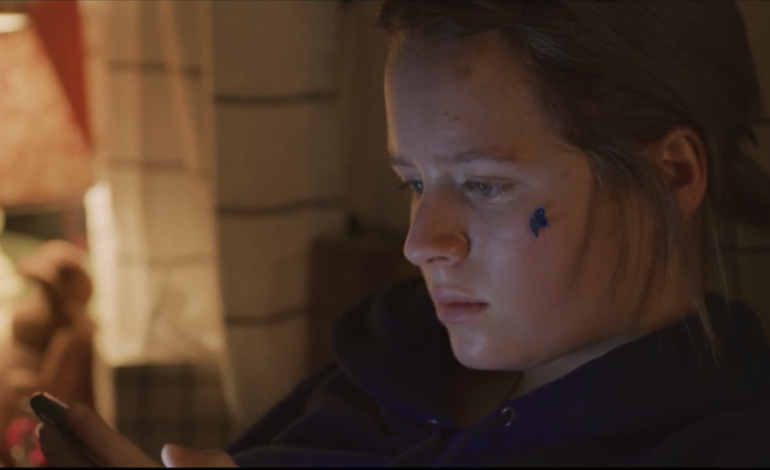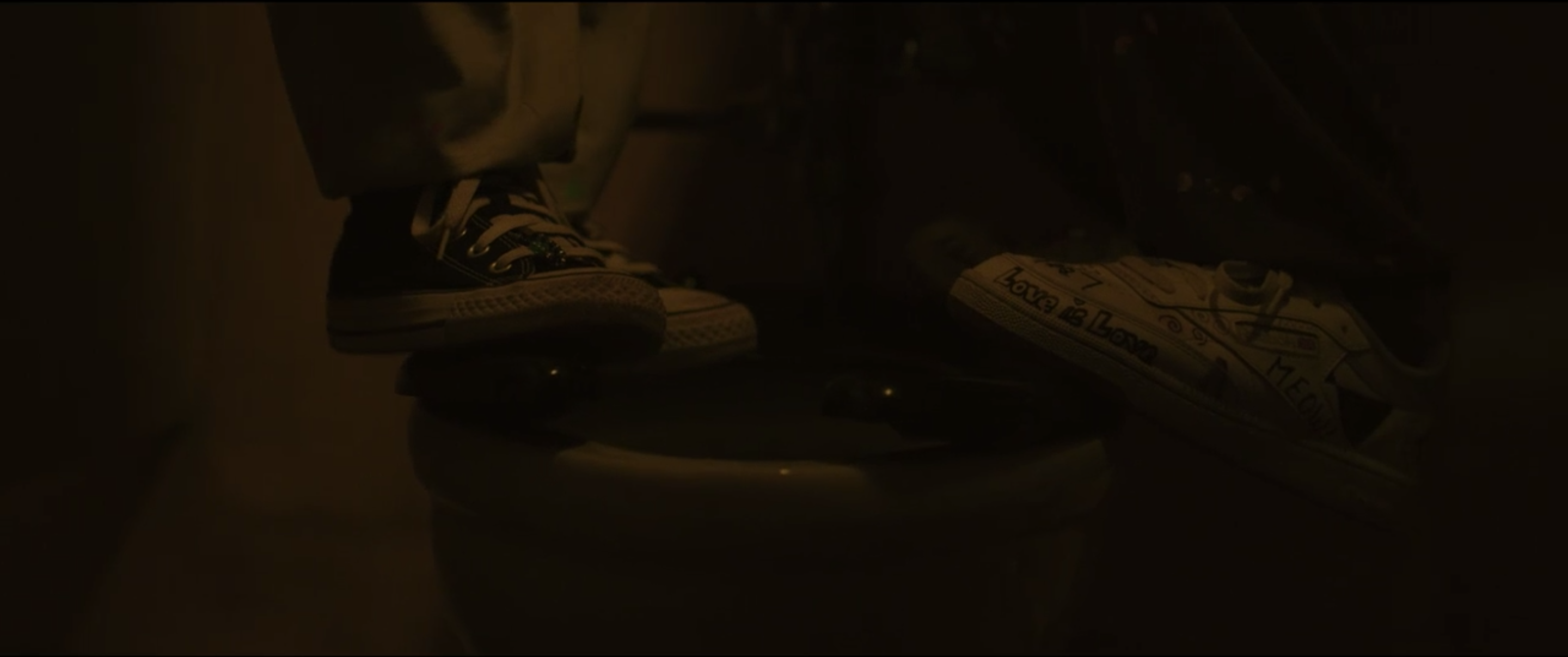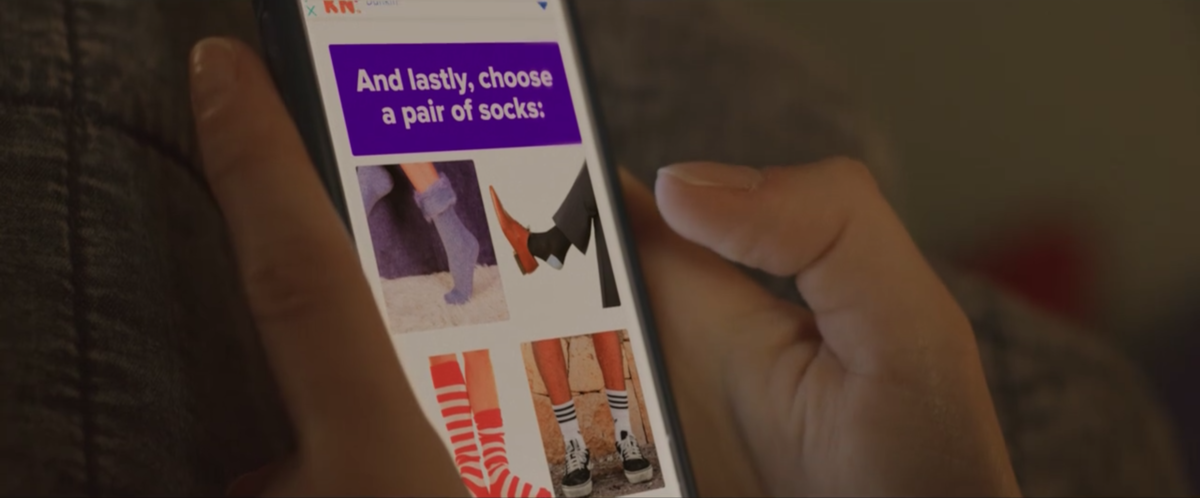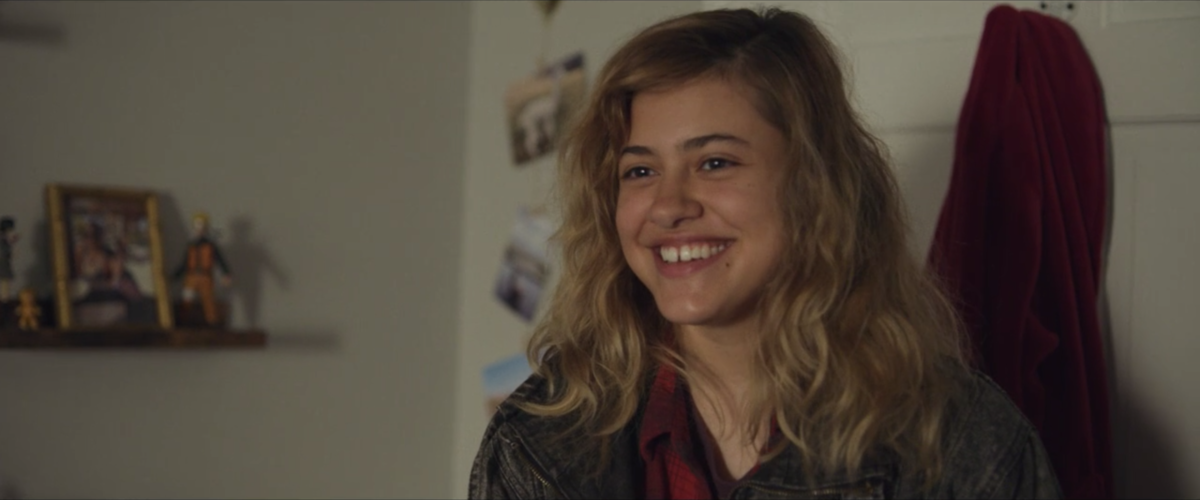

While the previous episode “Life Plan for Two, Followed By One” touched on the topic of middle school girl crushes, this episode of Modern Love dove headfirst into the gen-z middle school experience as it tells the story of middle schooler Katie (Lulu Wilson, The Haunting of Hill House) as she comes to terms with a developing crush she has on classmate Alexa (Grace Edwards, Schooled) amidst her tumultuous home life and trying to make sense of her identity and place in the world like everyone else her age. With a strikingly real and accurate depiction of youth and the transitional period that is pre-adolescence, this episode begs the question of how this episode managed to portray young people successfully when so many other films and shows have tried and failed.
Movies and TV are notorious for representing teen social behavior and technology use in the most unrealistic way possible, yet duo Logan George and Celine Held managed to not only do so accurately, but went above and beyond in terms of interweaving every aspect into the narrative, creating a cohesive story about young people that actual young people could see themselves in. It also doesn’t hurt to cast actual teenagers rather than mid-to-late twenty-year-olds as teenagers to get away with more questionable content. (Looking at you, Riverdale).
Katie was an endearing character to follow, Lulu Wilson being able to channel her inner middle schooler (which, considering her ripe age of fifteen, her memories and experiences are still rather fresh), and her relationship with her friends and her family felt incredibly genuine, especially when it came to the conflicts. While Katie’s exact home situation isn’t universal, the broad strokes of their interactions were, and it was the casual way that the conflicts were depicted that made the episode feel as though it was a peek into the life of a very average pre-teen; adolescent angst is not the exception, it’s the rule.


The brunt of the episode’s success was divided equally between Wilson’s stellar performance and the spectacular attention to detail George and Held put into both their writing and directing.
The way they wrote Katie and her peers was one of the most noteworthy aspects. Not simply in their line of thinking or the terms they used—such as Moush (Telci Huynh, Drama Club) and her avid belief in horoscope compatibility and dreams of a double wedding with her best friend, as well as Tyler (Damien Galvez) and his use of “alright, bet,” the duo managing to have him use it in such a way that it sounded natural despite the term itself sounding stilted when used in the real world by its demographic—but also in how Katie acted and interacted with people, which was the majority of the episode.
Her interaction with Alexa when they first met was adorable, the two bonding over anime but still unsure of how to talk to each other as they just met, and this earnestness continued throughout the episode, such as when Katie made her mom wait for her because she wanted to talk with her crush for as long as possible, as well as when Katie kept seeking out Alexa in the crowd during the lock-in games; audiences of any identity can relate to these experiences in some way, and it elicits a fondness from older viewers as they witness an experience like their own but without the potential negative additions that come with memory.
Katie and her family dynamic was also well executed. The casual way Katie explained her mother’s “traumatic” car accident to Alexa was both amusing but also representative of how certain people do talk about past trauma or past negative experiences that they have, to an extent, resigned themselves to; it develops her character in such a subtle way while also providing exposition and revealing more about Alexa as well. In all, that particular after school hallway scene was outstanding from beginning to end.
While the scene between Katie and her mother in the car was a sweet moment that showed the two connecting without resolving everything about their relationship, the most notable interaction the two had was when Katie was packing for the lock-in. When Katie finds that her sleeping bag has a giant rip in it and her only other option is her little sister’s Peppa Pig sleeping bag, she lashes out in frustration, most likely stemming from fear of embarrassing herself in front of Alexa. It’s because of this seemingly minor issue that leads to her having a small meltdown, bringing up her resentment of her mother’s absence and arguing with her, and while the conversation changed to unresolved issues, it had all stemmed from a rip in the sleeping bag her crush was going to see; while not all audiences might empathize, many will remember being young and feeling so strongly about everything, and the scene was a pleasant surprise in an episode that had already exceeded expectations.


Of course, the titular quizzes cannot be overstated, as they were a running motif throughout the episode and provided far more insight into Katie and her character than initially expected. Wilson’s performance when Katie takes the quizzes showcase just how much stock she places in the results. That isn’t to mean that she’s naive, but rather that she’s young and trying to find something that fits, which is why she repeats the quizzes and chooses different answers at times; she has a suspicion of knowing who she is, but she needs validation from the rest of the world whom she feels have more authority. It’s something every person has experienced in some form, which makes this so relatable despite the specifics.
The use of social media was also well done as it didn’t try and overdo what the different apps do or tried to make them something that they’re not. Instead, they’re exactly as they’re used with the same level of effect they have. They’re also not used as a way to determine whether or not Katie or her classmates are more or less vapid because they’re on their phones, rather they focus on the content and its effects on the person, which is how social media actually works. The understanding of that is another example of why this episode works so well.
That being said, the episode did have one weak point, which was the lack of resolution with Katie’s friends. The episode managed to resolve the main plot thread and leave Katie’s familial plot line in an acceptable place to step away, there was no resolution with her friends or Tyler. With the closeness of Katie’s friend group, their insistence that she be with Tyler, Tyler’s crush on Katie, and Moush’s confrontational attitude that is shown during the low point of the episode when Katie pretends not to know Alexa and throws her under the bus, the episode felt as though it was setting up a conflict that involves Katie being put in a difficult situation as a result of the Tyler plot thread.
Instead, there was no resolution, not even with Katie’s friends who were confused as to why she ditched them, there wasn’t even a simple text to show that there aren’t any hard feelings. Those characters and their established conflicts all faded into the background which left all of those relationships up in the air and made the episode feel incomplete, especially since the school and Katie’s other relationships were such a prevalent part of the episode. While it didn’t detract from the main storyline, it was something of note as the run time dwindled and did affect the episode as a whole.


But the episode overall was a success and the definite highlight in terms of scenes was hands down the final scene in Alexa’s bedroom.
While saturated in middle school awkwardness, the final scene between Katie and Alexa managed to convey a powerful message, especially when directed to young people going through the same experience as Katie, when Alexa said, “Then that’s okay. If you wanted to.” As shown by Katie, self-discovery is one-fourth listening to oneself and three-fourths listening to the rest of the world—whether they be real people or Buzzfeed quizzes—to determine what feels right and what one feels they should embrace or hide. Alexa’s statement is objectively simple and, to some adults, might seem like common sense, but to others, particularly the depicted age demographic and those who have been made to feel ashamed for who they are, it has the power to pierce through the haze and lead right into self-acceptance without any hidden clauses or fine print details attached; except, of course, like Katie had asked, that the other person is consenting as well.
Overall, this episode fulfilled all it set out to do, and was an enjoyable trip down memory lane—which is a feat in of itself as the consensus seems to be forgetting middle school ever happened—and it fit beautifully with the rest of the series and this particular season, especially as it focuses on young people the entire time which hasn’t been the case with any of the previous episodes.
Rating: 8.75/10
